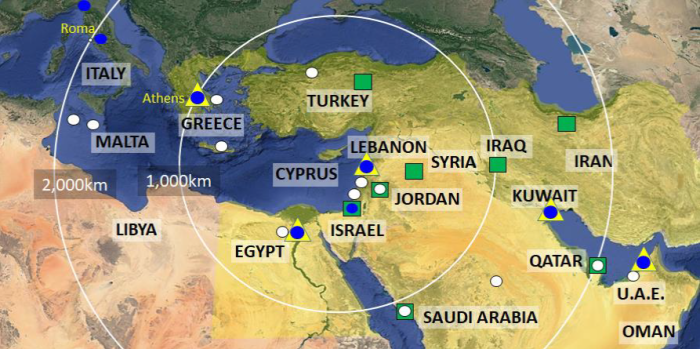About EMME-CARE
The Eastern Mediterranean and Middle East – Climate and Atmosphere Research (EMME-CARE) project, has been established with a view of creating a regional Centre of Excellence (CoE) for climate and atmosphere research in the Eastern Mediterranean and Middle East (EMME) region, which has been identified as a global climate change “hot spot”.
Through €45 million funding received from the European Union’s research and innovation program (under grant no. 856612) and the Cyprus Government, EMME-CARE upgraded the Atmosphere and Climate Division of the Cyprus Institute to create a new CoE – the Climate and Atmosphere Research Center (CARE-C).
About CARE-C
CARE-C was officially launched in January 2020 and it operates as part of the Cyprus Institute. In establishing CARE-C, the Cyprus Institute joined forces with world-leading institutes in the field of climate and environmental research that are acting as its Advanced Partners: the Max Planck Institute for Chemistry (MPIC) in Germany, the French Alternative Energies and Atomic Energy Commission (CEA) and the University of Helsinki (UHEL),
CARE-C has set out to address the risks associated with air pollution and climate change in the EMME through a combination of research, innovation and education activities with a regional focus. The new CoE capitalizes on the strategic geopolitical location of Cyprus to create a link between Europe and the Middle East, acting as a knowledge hub for environmental and climate change research and fostering the creation of innovative and sustainable solutions that can help address the challenges facing the EMME region.
Specifically, CARE-C focuses on:
- Science and Research on Climate Change and Air Pollution over the Eastern Mediterranean and the Middle East (EMME) region.
- Innovation and Entrepreneurship focusing on identifying promising commercial research applications that contribute to the sustainable economic growth of Cyprus in a highly competitive international environment.
- Education and Training with post-graduate degree courses on meteorology and atmospheric sciences, trainings on climate change and weather forecasting, and hands-on practice and knowledge transfer on atmospheric instrumentation.
Through furthering scientific leadership and excellence in climate and atmosphere research and promoting its applications in the context of public policy and sustainable economic growth, CARE-C aims to contribute to a healthier planet, and the shaping of a safer, more prosperous future for the citizens of the EMME region.
CARE-C works in close collaboration with its Advanced Partners as well as many national institutions and organizations in Cyprus and the region. The work and collaborations focus on societally relevant issues related to the environment, atmosphere and climate, and natural resources in the EMME region.
Further, relevant research activities have been nationally embedded in Cyprus through strong collaborations with the Departments and Units of the Ministry of Agriculture, Rural Development and Environment, the Ministry of Labor, Welfare and Social Insurance, the Ministry of Defense, and the Ministry of Health.
Vision
A population of about 400 million is affected by dust storms, dryness, heat extremes and unparalleled air pollution in the Eastern Mediterranean and Middle East (EMME) region, with severe environmental, health and socio-economic effects. Identified as a global climate change hotspot, the region is already facing adverse impacts ranging from extreme weather events to poor air quality, which are only due to intensify in the coming decades.
If no action is taken, these harmful effects could soon lead to intolerable environmental conditions in the region, ultimately compromising human habitability and forcing mass migration.
EMME-CARE aims to address these challenges through the establishment of a knowledge hub for environmental and climate change research, and sustainable solutions.
Well-known attributes of the EMME are its vast hydrocarbon resources (two-thirds of the world’s known oil and natural gas reserves) and the large potential to harvest energy from the sun. Cyprus is strategically located in the EMME at the intersection between Asia, Africa and Europe, providing an invaluable link between Europe and the Middle East. The region faces many challenges, such as rapid population growth (further to its current about 400 million inhabitants), as well as political and socio-economic instabilities. These challenges, experienced by a part of the world that is already hot and arid, are exacerbated by droughts and the extreme weather conditions associated with rapid climate change. The goal of limiting global warming to less than 2°C, agreed at the 2015 Conference of Parties in Paris, will not be sufficient to prevent adverse climate change impacts in the EMME, where the rate of temperature change in summer is more than twice the global mean. The number of exceptionally hot days has already doubled since the 1970s. These extremes of temperature, in combination with increasing air pollution and windblown desert dust, could in the near future lead to intolerable conditions in both urban and rural environments, ultimately compromising human habitability and promoting migration.

Figure: The Eastern Mediterranean and Middle East (EMME) Region
EMME countries highlighted in yellow
White circles: 1,000 and 2,000km distance from Cyprus
Blue dots: partners with existing Memorandum of Understanding (MoU)
White dots: partners with planned MoU
EMME-CARE professorship network
Yellow triangles: established
Green rectangles: to be established
International collaboration and solution-oriented research are needed to address these challenges in a region where climate change and related environmental pressures could undermine sustainable development and stability. Research, education and regional networking are the pillars that EMME-CARE builds upon to foster innovation and outreach. Knowledge transfer from advanced European partners to the EMME, where investments in environmental policy solutions and innovation have yet been limited, will have returns for Cyprus, the region and the European Union.
Regional Partners
Recognizing the need to build regionally oriented scientific knowledge on climate change impacts and better integrate current and future national interests and policies on the topic, EMME-CARE has established a Regional Professorship Programme with a view of developing a Mediterranean and Middle Eastern science and policy strategy on climate change.
EMME-CARE aims to engage the key regional players through co-funding a tenured faculty position, within leading regional Universities or Research Centers, and supporting research activities on climate change to be pursued collaboratively between their organization and the Cyprus Institute.
Partners EMME-CARE has already engaged with in the context of its Professorship Program includes the following:
- Greece: University of Athens (UOA)
- Lebanon: American University of Beirut (AUB)
- Jordan: Jordan University, Amman
- Egypt: Cairo University, Cairo
- Kuwait: Kuwait Institute for Science and Research (KISR)
- A.E.: Zayed University, Abu Dhabi
Advanced Partners
Governance
The CARE-C Centre of Excellence (CoE), stemming from the EMME-CARE project, (H2020 GA no.856612), is embedded into the legal structure of the Cyprus Institute (CyI), but has full autonomy both in its executive decisions and in defining its Research and Innovation agenda. This autonomy is already in place in all of CyI’s Research Centers and has shown to be a key driver for their rapid development and competitiveness.
CARE-C’s autonomy is retained through the institution of the EMME-CARE Management Board that oversees the operations of the Centre.

-
Management Board
The Management Board is the ultimate decision-making body of the Consortium and Center, with full oversight of and responsibility for the operations of the centre. The Management Board will make decisions on budget, recruitment and internal affairs and will report directly to CREF. It reports directly to the CyI President and has the prerogative to safeguard the independent-decision making capacity of the centre in the implementation of its R&I agenda, operational and administrative policy and of its educational activities. The management board will approve the hiring of senior scientific and technical personnel for the centre and will approve and monitor the implementation of the centre’s annual budget.
-
General Assembly
The General Assembly acts is the body comprising of all the centre’s employees (researchers, technical experts, administrative and support staff), with an appointed representative to the MB every two years. It is a body that will ensure the smooth development of the Research Center, offering equally to all the CyI employees working in EMME-CARE the possibility to express their opinions (and share ideas) on the ways to improve the working environment of the Research Centre, thus providing a participatory element. Administrative information (budgets, recruitments, internal policies) will also be presented and explained during the meetings of the GA to further enhance transparency.
-
Scientific Expert Panel
The Management Board of the centre is advised and aided by an international panel of experts (SEP) with expertise related to the centre’s activity. Built on the existing CyI research centre model, the SEP will have competencies in the research and innovation topics covered by the four R&I departments. SEP will also address issues related to diversity, gender, integrity, and GDPR. Every year, the SEP will go through an in-depth evaluation of the performance (KPIs) and objectives of the centre in general and more specifically for each R&I department. The SEP will be composed of atmosphere and climate experts already engaged in the EEWRC SEP, while additional members will be appointed by the CyI Scientific Advisory Council with additional expertise (e.g. innovation) and international dimension.
-
International Policy Advisory Board
The International Policy Advisory Board (IPAB) will support the new centre in its endeavours to promote and structure an active dialogue between the scientific community of CARE-C and regional and international policy makers on the development of transnational solutions. Composed of leading regional and international policy makers, stakeholders, and opinion-formers, the IPAB will facilitate the transfer of new regionally focussed scientific knowledge of the impact of climate change and support its translation into current and future national interests and policies.
-
Administration & Management
The Coordinator of the EMME-CARE Project, Prof. Jean Sciare is currently the interim Director for a maximum period of two (2) years, until the relevant competitive recruitment process is completed.
The Director reports to the Management Board of the CoE and it’s Chair. The Director is appointed for a five (5)-year term (renewable) and bears the responsibility for leading, planning, implementing strategy, and managing the functioning and operation of the centre. In close collaboration with the heads of the different research and innovation departments, the Director defines the research, innovation and educational strategic planning of the centre for review by the Scientific Expert Panel and for final approval by the Management Board.
The Director is also responsible for drawing up the yearly budget of the centre, submitting it for approval to the Management Board, and overseeing its implementation. Finally, the Director reviews information on the progress of the Center projects, including the EMME-CARE project, according to the frequency defined in the Grant Agreements, examine that information to assess the compliance and, if necessary, propose modifications of the Consortium Plans to the Management Board.
-
Support Operations
The CoE will be operated by the Research and Innovation Support Operations (RISO). According to the Grant Agreement, the Administrative Offices to be established within RISO are: Project Management, Human Resources, IT, Communication & Outreach, Finance & Accounts, Procurement, Physical Infrastructure, Innovation & Business Development, Grants & Tenders Writing.
Operating at the interface between the CYI administration and the new CoE, RISO will contribute to the fast and efficient establishment of the Centre, improve its overall smooth operation by facilitating the workflow with CYI. Therefore, RISO will be structured to enable it to respond in the most efficient way to the CoE’s specific needs, and safeguard its capacity for taking autonomous decisions. This structure encompasses and incorporates “best practices” as implemented by the Advanced Partners, with the goal of reflecting the attributes of a high-performing research organizations, while maintaining a versatile and flexible mode of operation, adapting to the evolving needs and autonomy of the new CoE.
















